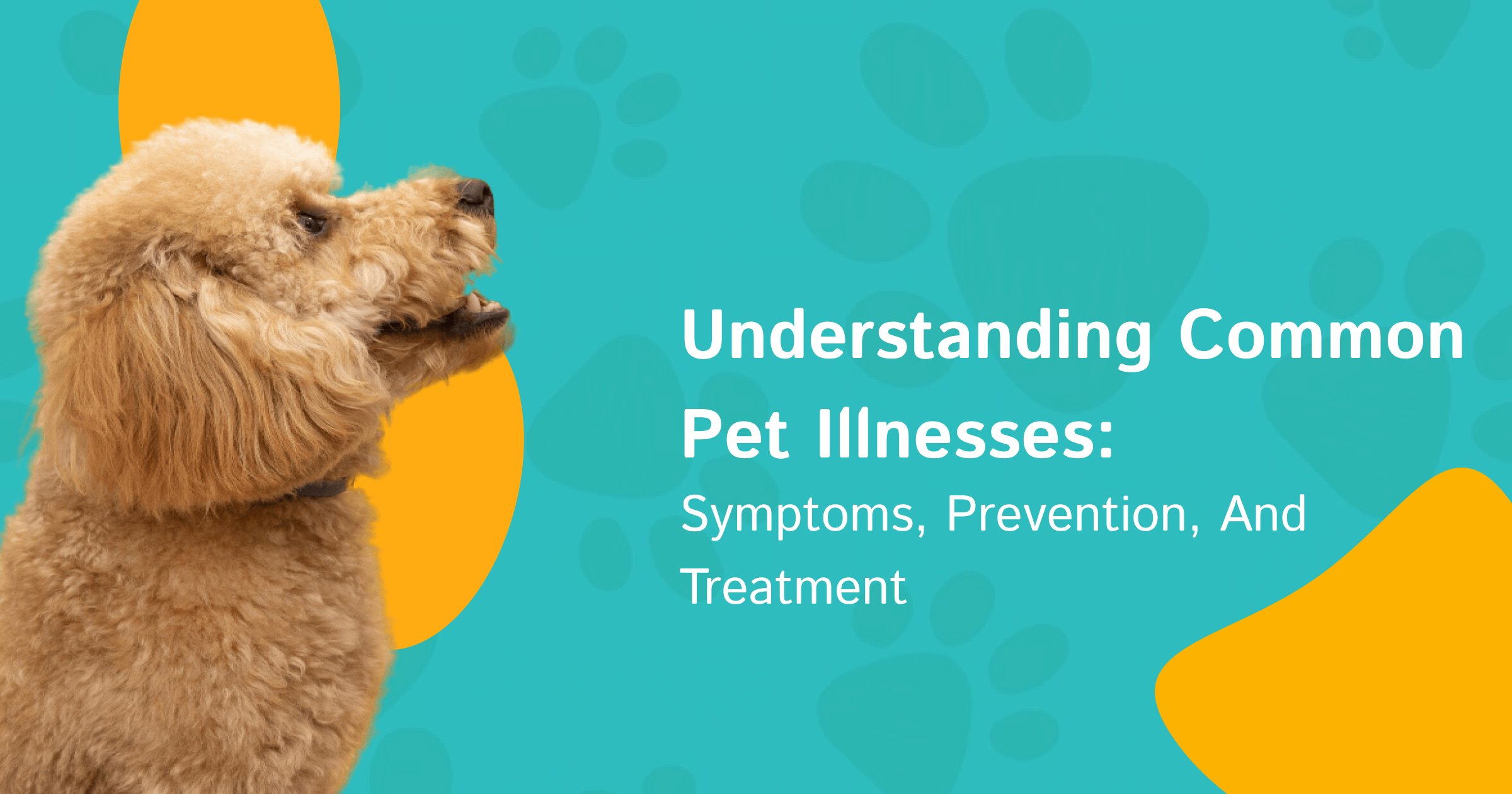Pet ownership is a fulfilling journey filled with joy, but it demands responsibility for our furry companions' well-being. In this insightful article, we explore the complexities of common pet illnesses, shedding light on symptoms, preventive strategies, and effective treatments. Our goal is to empower pet owners with knowledge, enabling them to proactively nurture the health and happiness of their beloved pets. Let's embark on this journey together, understanding the nuances of pet care and embracing practices that ensure our pets thrive. After all, a healthy and content pet is the ultimate source of companionship and joy in our lives.
I. Introduction
Understanding common pet illnesses is valuable for responsible pet ownership. It goes beyond just caring for their basic needs; it's about being a proactive and attentive companion. Recognizing the early signs of ailments, from respiratory issues to skin conditions, enables pet owners to ensure timely and effective treatment. This knowledge also plays a crucial role in prevention, advocating for regular veterinary check-ups, vaccinations, and creating a pet-friendly environment. By grasping the nuances of pet health, we empower ourselves to provide the best care, fostering a strong bond with our furry friends. It's the key to a fulfilling and enduring companionship, ensuring our pets lead happy, healthy lives.
Connection between Pet Health and Responsible Ownership
Responsible ownership goes beyond providing food and shelter; it's about fostering a deep connection between pet health and overall well-being. When we understand and prioritize our pets' health, we create an environment where they thrive emotionally and physically. Regular vet check-ups become more than a necessity; they're a commitment to preventive care. By recognizing subtle changes in behavior and addressing them promptly, responsible pet owners ensure their furry friends lead fulfilling lives. It's a symbiotic relationship – as we invest in their health, our pets reward us with boundless love and companionship, solidifying the bond that makes pet ownership a truly enriching experience.
II. Common Pet Illnesses
1. Respiratory Infections: Respiratory infections are prevalent among pets and can range from mild to severe. Recognizing symptoms such as coughing, sneezing, and labored breathing is crucial for early intervention.
2. Gastrointestinal Issues: Digestive problems, including vomiting and diarrhea, are common health issues in pets. Exploring the causes and implementing dietary adjustments can alleviate these issues.
3. Parasitic Infections: External and internal parasites pose a threat to pet health. Understanding prevention methods, such as regular deworming, is vital for keeping these unwanted guests at bay.
4. Skin Conditions: Skin ailments, from allergies to infections, can significantly impact a pet's comfort. Identifying triggers and providing proper skincare are essential for managing these conditions.
III. Symptoms Recognition
Recognizing the signs that something might be amiss with your furry friend is crucial for their well-being. Symptoms of pet illnesses can manifest in various ways, often communicating their discomfort when words aren't an option. Keep an eye on behavioral changes, such as sudden lethargy, increased aggression, or withdrawal, as these can be subtle indicators of an underlying issue. Physical signs, like changes in coat quality, unusual lumps, or alterations in body weight, offer visible cues to your pet's health.
Additionally, closely monitor eating and drinking habits; any sudden shifts may signal a problem. Pets can't verbally communicate their distress, but paying attention to these nuanced signs allows you to be their advocate, ensuring timely veterinary care and maintaining their quality of life. Remember, being attuned to your pet's well-being is an integral part of responsible and loving pet ownership.
IV. Preventive Measures
Taking preventive measures is a cornerstone of responsible pet ownership. Regular veterinary check-ups are like health checkups for humans, helping identify potential issues before they escalate. Vaccinations play a crucial role in shielding your furry friend from various illnesses, forming a protective barrier against common threats. Beyond the vet's office, creating a pet-friendly environment at home is essential. This involves removing hazards, ensuring a balanced diet, and providing mental and physical stimulation. Think of it as creating a safe haven where your pet can thrive.
By embracing these preventive steps, you not only enhance your pet's overall well-being but also contribute to a fulfilling and enduring companionship. After all, a little proactive care today ensures a healthier and happier tomorrow for your beloved four-legged family member.
V. Effective Treatment Options
Ensuring our furry friends receive the right treatment is beneficial for their well-being. Here are top effective treatment options that can make a significant difference in your pet's health.
1. Timely Intervention: Recognizing symptoms early and seeking professional help promptly can prevent the escalation of health issues, ensuring a quicker recovery.
2. Medication Precision: Administering medication with care and precision is crucial. Understanding dosage, frequency, and potential side effects ensures the effectiveness of the prescribed treatment.
3. Lifestyle Adjustments: Pets with chronic illnesses may benefit from lifestyle modifications. Adapting their routines to provide comfort and support enhances their overall quality of life.
4. Holistic Approaches: Integrating holistic practices, such as acupuncture or herbal remedies, can complement traditional treatments, contributing to a more comprehensive healthcare strategy.
5. Balancing Traditional and Alternative Treatments: Finding the right balance between traditional and alternative treatments ensures a holistic approach to pet health, maximizing the chances of recovery. Each pet is unique, so tailoring treatments to their individual needs is key for optimal results.
VI. Nutritional Aspects
Nutritional aspects play a pivotal role in ensuring our furry friends lead healthy and fulfilling lives. Just like us, pets require a balanced diet tailored to their specific needs. A well-rounded nutrition plan not only contributes to their overall well-being but also acts as a preventive measure against common illnesses. It's more than just filling their bowls; it's about providing the essential nutrients that support their growth, maintain optimal body functions, and boost their immune systems. Whether it's choosing the right commercial pet food or preparing homemade meals, understanding the nutritional requirements of your pet is key. Consultation with a veterinarian can guide you in crafting a diet that addresses individual health needs, ensuring your pet receives the nourishment necessary for a vibrant and energetic life. Remember, a healthy diet is the cornerstone of a happy and thriving pet.
VII. Mental Well-being for Pets
In the hustle and bustle of our lives, we often forget that our pets, too, experience stress and anxiety. Addressing the mental well-being of our furry companions is not just a luxury but a necessity. Imagine a world where your pet's tail wags not just because they're excited to see you, but because they're genuinely content within. From the gentle purring of a cat to the playful antics of a dog, mental well-being for pets is about understanding and alleviating their stressors. Engage in activities that stimulate their minds, offer a safe and secure environment, and be attuned to their emotional cues. Whether it's a cozy corner for a cat nap or a lively game of fetch, these simple gestures contribute to a happy and mentally balanced pet. Because a pet at peace is a true companion, enriching our lives with their boundless joy and unwavering affection.
VIII. Pet Insurance
Considering the uncertainties life throws at us, ensuring your furry friend's health is a top priority. Enter pet insurance—the ultimate safety net for your four-legged family member. Picture this: your pet falls ill or faces an unexpected injury, and you're left with hefty vet bills. That's where pet insurance steps in, offering peace of mind and financial support. It covers everything from routine check-ups to emergency surgeries, providing a buffer against unexpected medical expenses. With the right plan, you can focus on giving your pet the care they need without worrying about breaking the bank. Think of it as a wise investment in your pet's well-being, ensuring they receive the best medical attention whenever they need it. Don't let financial concerns stand between your pet and optimal healthcare—secure their future with pet insurance today.
IX. Conlusion
Owning a pet is a delightful journey, but it comes with responsibilities. This article explores the realm of common pet illnesses, guiding pet owners on the path to proactive care. Learn to read the subtle signs, intervene early, and embrace preventive measures for a pet's well-being. From respiratory issues to dietary considerations, we cover it all. Discover the importance of a balanced diet, mental stimulation, and the role of holistic practices. Real-life stories showcase the resilience of pets and the lessons learned from successful treatments. Unveil the world of pet insurance, a financial safety net for unexpected health challenges.
In conclusion, understanding your pet's health empowers you to provide the best care, ensuring they lead happy lives filled with tail wags and purrs. Cherish your furry companion – a source of boundless joy and unconditional love.
X. Frequently Asked Questions (FAQs)
Q1. What are the Early Signs of Common Pet Illnesses?
Early signs may include changes in behavior, appetite, and physical appearance. Keep an eye on any unusual symptoms and consult your vet promptly.
Q2. How Often Should I Take My Pet to the Vet for a Check-up?
Regular check-ups are recommended at least once a year for healthy pets. Older or ailing pets may need more frequent visits.
Q3. Can I Prevent Pet Illnesses Through Diet Alone?
While a balanced diet is crucial, it's not the sole preventive measure. Regular veterinary check-ups, vaccinations, and a safe environment also play vital roles.
Q4. Are Alternative Treatments Effective for Pets?
Alternative treatments can complement traditional medicine. However, their effectiveness varies, and it's essential to consult with a qualified veterinarian.
Q5. Is Pet Insurance Worth the Investment?
Pet insurance provides financial security and ensures that you can afford the best care for your pet in times of need. It's a valuable investment in their health and well-being.







Post Comments